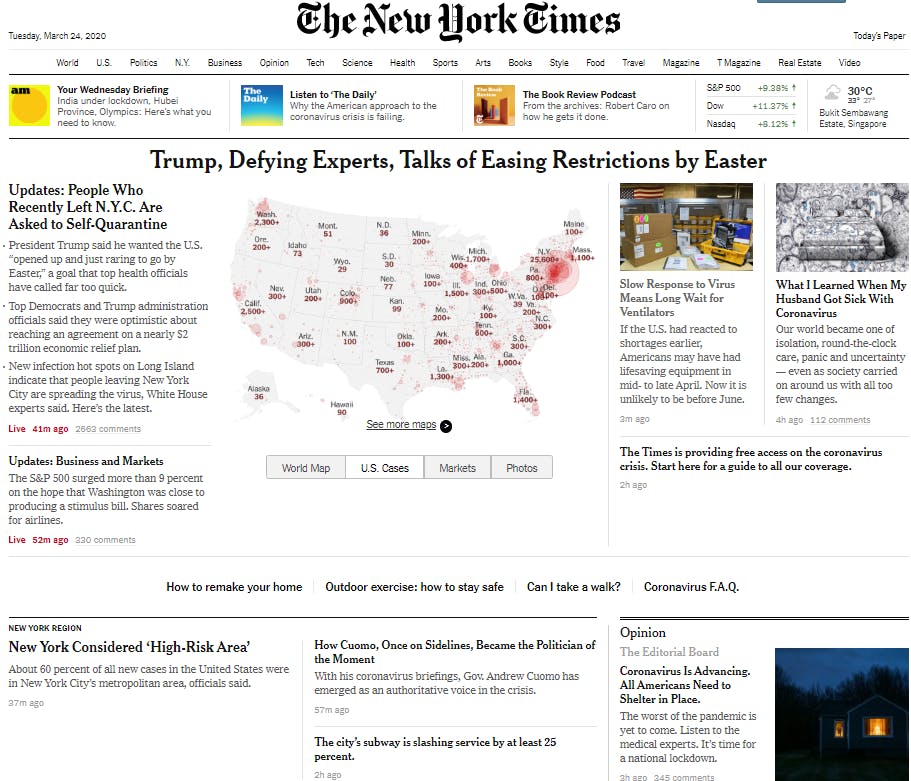For publicists trying to get a sustainability story that is not related to a certain pathogen into the mainstream press, it’s been a frustrating time.
To continue reading, subscribe to Eco‑Business.
There's something for everyone. We offer a range of subscription plans.
- Access our stories and receive our Insights Weekly newsletter with the free EB Member plan.
- Unlock unlimited access to our content and archive with EB Circle.
- Publish your content with EB Premium.
“The urgent need to respond to the [Covid-19] pandemic and its impacts is rightly taking priority. However, climate change and deforestation remain existential threats…,” began a press release this week for a report by Environmental Paper Network on how banks were failing to protect forests from the pulp and paper industry.
The wording of the press release was similar to many others the Eco-Business newsroom has received over the last month or so, and it’s an understandable strategy.
No story so far this century, even the September 11 terrorist attacks in 2001 or the global financial crisis in 2008, has dominated the media quite like “coronageddon”.
“I have never seen anything that has so consumed media attention,” commented Iain Twine, a communications expert who runs Singapore-based public relations firm Harrup Advisory. “Every country’s response [to Covid-19] is of interest.”
“
Climate change has always been couched as tomorrow’s problem, and people don’t worry about tomorrow when there is a clear and present threat today.
Edwin Yeo, general manager, SPRG Singapore
“During the global financial crisis, what each country did wasn’t as interesting. With Covid-19, global news is now front and centre alongside local news,” he told Eco-Business.
Every other type of news has been bulldozed to the back pages by the pathogen, which has infected 423,000 people and killed almost 19,000, at the time of publishing.

The homepage of the website of the New York Times newspaper on Wednesday 25 March. Image: nytimes.com screengrab
While any number of lost lives is potentially newsworthy, it’s worth considering that even the Spanish influenza, a pandemic that killed 50 million people in the early 1900s, is unlikely to have anywhere near the impact of climate change: extreme weather, ecosystem collapse, crop failure, climate-related wars and, yes, increasing incidences of infectious diseases could claim billions of lives.
“At this juncture, readers are mainly anxious about their health, what they should do and how the measures [to contain the virus] affect their lives,” said Edwin Yeo, general manager of public relations firm SPRG Singapore.
“Climate change has always been couched [by the media] as tomorrow’s problem, and people don’t worry about tomorrow when there is a clear and present threat today,” said the former Singapore Press Holdings journalist.
Newspaper editors go where the readers are. Social media monitoring firm Sprinklr counted almost 20 million mentions of coronavirus-related terms in a single day, 11 March, when the World Health Organisation defined the outbreak as a pandemic. Using “Covid-19” or “coronavirus” in the headline of a story guarantees eyeballs.
The best-read story on Eco-Business so far this year is a fairly niche story about the use of reuseable face masks to guard against the virus. The only stories to cut through the Covid noise have been about how the solar industry can go circular, South Korea’s net zero ambitions and the race to cut the carbon footprint of rice.
Stories that would usually draw a big audience on Eco-Business, such as how to tackle record carbon emissions, have barely registered.

The homepage of Singapore newspaper The Straits Times’ website on Wednesday 25 March. Image: straitstimes.com screengrab
Numerous news articles have considered how Covid-19 is linked to our relationship with nature—for instance how humanity is “playing with fire” through the wildlife trade from which the virus originated. But stories that focus purely on climate change have all but disappeared from the media landscape.
Newsrooms have only limited resources, and it is understandable that they try to cover a story of this weight from every conceivable angle. But could it be that Covid-19 is crowding out a story that is potentially much bigger?
While the world is being inundated with coronavirus news…
- Australia’s devastating bushfires have been succeeded by flash flooding
- Europe just had the hottest winter on record
- China is driving the biggest revival of coal capacity since the Paris Agreement
- Antarctica’s Pine Island Glacier lost an ice sheet 130 square miles in surface area
- The Great Barrier Reef was hit by a third major bleaching event in five years
The reality, though, is that the coronavirus and climate change have much in common, particularly since a warmer world promises more frequent pandemics.
For climate change to reclaim its place on the media agenda, activists should be forewarning that unless humanity changes its relationship with the environment, lockdowns could become common, Twine suggested.
“This new normal we are experiencing across the world, is a potential precursor to what a climate crisis might look like,” said Twine.
Kim Stengert, chief of strategic communication and external relations for World Wide Fund for Nature Singapore—whose annual movement Earth Hour has had to move online this year because of the virus—told Eco-Business that, for the first time, people are experiencing food security concerns, the real implications of disrupted global supply chains, and what it feels like to have our lives turned upside down.
“These issues are also scenarios that are part of the climate emergency, and we now know what it means,” he said.
Another story the media should be telling to connect the coronavirus to climate is more positive. As Assaad Razzouk, the chief executive of renewables firms Sindicatum points out, the virus has shown how quickly the world can respond to a crisis.
“It’s incredible how the world is fighting coronavirus,” he said. “Yes, we have weaknesses, mostly to do with incompetent governments. But the ability to act at speed is proven. We can mobilise, fight and beat climate change.”






















